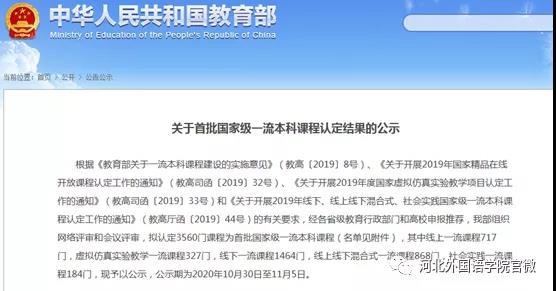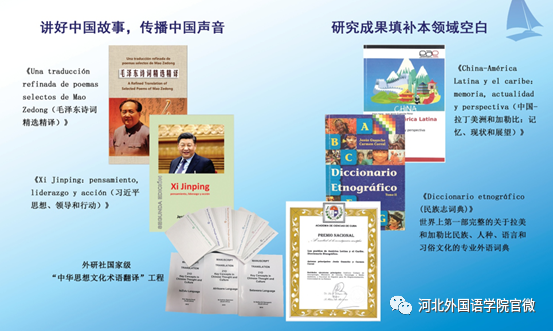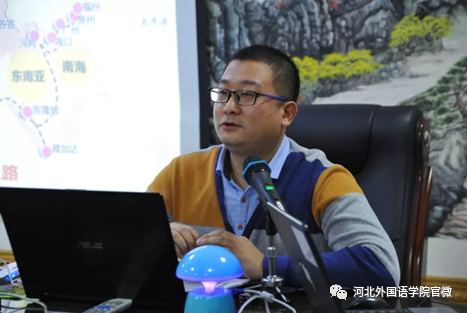发布日期:2020/11/15 16:32:23 访问次数:1085

The Higher Education Department of the Ministry of Education officially announced the results of the first batch of national-level first-class undergraduate courses. After application and recommendation by various provincial education administrative departments and universities, the Ministry of Education organized network reviews and conference reviews, and recognized 3560 courses as the first batch of national-level first-rate undergraduate courses , Hebei Province’s 22 colleges and universities 67 courses are listed on the list. As the course leader, Dr. Yang Zhen from Hebei Foreign Studies University led Hebei Province’s excellent teaching team to build the China-Latin America and Caribbean Relations course selected as the first batch of national first-class undergraduate courses by the Ministry of Education.

As of June 30th in 2020, there are a total of 3005 colleges and universities across the country, including 2740 regular colleges and universities, including 1258 undergraduate colleges, 1482 vocational colleges and universities, and 265 adult colleges. Among the 1258 undergraduate colleges and universities nationwide, 619 colleges and universities were selected as the first batch of national first-class undergraduate curriculum construction colleges. According to incomplete statistics, there are a total of 27 private universities and independent colleges selected nationwide, and a total of 2 in Hebei Province. This fully shows that the quality of undergraduate courses in Hebei Foreign Studies University is in the forefront of the country.
On June 21th in 2018, Minister Chen Baosheng proposed for the first time at the New Era National Undergraduate Education Work Conference for Colleges and Universities to effectively "increase the burden" on college students, increase the academic challenge of college students, increase the difficulty of courses reasonably, and expand courses Depth, expand the choice of courses, and truly transform the "nonsensical lessons" into a " high-quality lessons" with depth, difficulty and challenge. Immediately in August, the Ministry of Education issued the "Notice on Paying Close Attention to the Implementation of the Spirit of the National Undergraduate Education Work Conference for Higher Education in the New Era" , proposing that "universities should comprehensively sort out various courses. Teaching content, eliminate' nonsensical lessons', create 'high-quality lessons', reasonably increase academic challenges, increase the difficulty of courses, expand the depth of courses, and effectively improve the quality of course teaching. This is the first time that the concept of high-quality lessons" has been formally used in a document of the Ministry of Education. To rectify the teaching order in colleges and universities, "eliminate nonsensical lessons and create high-quality lessons" was officially written into the documents of the Ministry of Education for the first time.

To let the teachers can make a small effort to be able to take the high-quality lessons, Hebei Foreign Studies University has set up a five-level high-quality lessons system to create diversified courses, namely: fine micro-classes, college-level courses, school-level courses, and provincial-level courses. Open online courses and provincial-level first-class courses to encourage teachers to create high-quality lessons suitable for their own level in various courses. Up to now, 5 courses in Hebei Foreign Studies University have been rated as first-class undergraduate project construction courses in Hebei Province. Three courses have been rated as excellent online open courses in Hebei Province. Twelve courses won prizes in the provincial foreign language micro-class competition, and the school also built 14 school-level high-quality courses.

Hebei Foreign studies University advocates that when learning languages students should be immersed in culture and grow in a professional background in the course construction. Each major offers language courses, and all language courses offer cultural background courses. Hebei Foreign studies University proposed that language courses should incorporate the learning of 16 clear pictures of history, including literature, business, culture, finance, education, technology, and geography. The profound cultural heritage will help the rapid improvement of language learning. Only with a comprehensive understanding of language countries can students essentially stimulate students' interest in learning small languages. Only by changing passive learning to active learning can they learn an authentic language.

The introduction of the first batch of national first-class undergraduate course leader.
Yang Zhen, Ph.D., Spanish education, graduated from the University of Havana and Havana Normal University in Cuba. He is currently the Assistant to the President of Hebei Foreign studies University and Vice President of Foreign Affairs. Director of the Institute of International Education Law (Chinese Studies Center) of the Autonomous University of Chiapas, Mexico, Visiting Professor of the Humanities and Social Sciences Education Department of the Normal University of Havana, Cuba, the official journal of the American Spanish and Portuguese Teachers Association "Hipania-Spanish and Portuguese Teaching Reviewer of Journals (SCI and SSCI source journals). Dr. Yang Zhen is the third-level talent of Hebei Province's "Three Three Three Talent Project" and a famous teaching teacher of Hebei Province undergraduate colleges. He used to study and work in Latin America, has solid education and teaching knowledge and scientific research capabilities, and has rich international work experience. He is a "double capability trainer and dual ability" teacher. Dr. Yang Zhen served as the course leader and lecturer of the provincial top-quality online courses in Hebei Province's universities and the first-class provincial-level course "China-Latin America and Caribbean Relations", and presided over a number of scientific research projects. The research direction is the professional development of foreign language teachers, Spanish education and teaching, and Latin American and Caribbean education and culture. Participated in many international academic conferences and delivered keynote speeches, published many academic papers, and published 4 foreign language monographs in foreign countries.